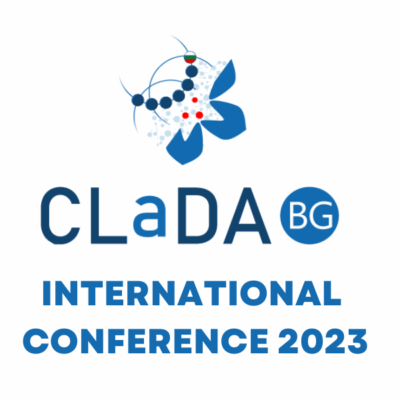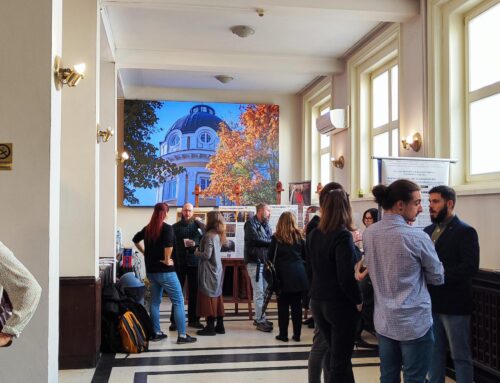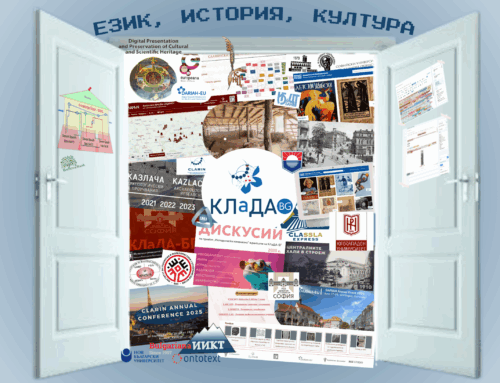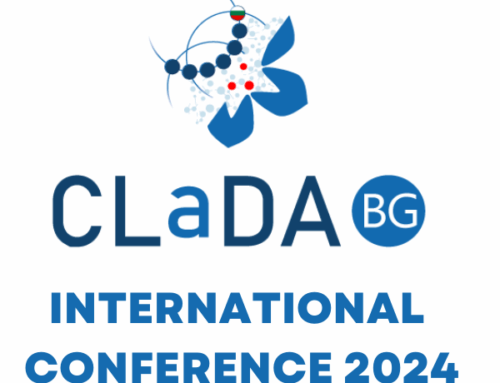
This is the second edition of the CLaDA-BG conference. It aims at bringing together NLP developers, linguists, digital humanitarians, scholars and all parties interested in knowledge modeling and linking data for research.
Language Technologies and Digital Humanities: Resources and Applications (LTаDH-RA)
CLaDA-BG 2023 Conference
Eurostars Sofia City
Sofia, Bulgaria
10-12 May 2023
Registration
Programme
The participation at the conference is free of charge. The fee for the conference dinner is 30 Euro. All participants are invided to registrate for the conference. The registration link is available here.
Venue
The conference will be held in Sofia. The first day of the conference (May 10) will take place in the “Prof. Marin Drinov” Hall at BAS-Administration (Sofia, 1040, 1 “15 November” Str.). The second and the third days (May 11 and 12) will be held at the conference hall of Eurostars Sofia City.
The officia language of the conference is English.
CLaDA-BG is the Bulgarian national research infrastructure for resources and technologies for linguistic, cultural and historical heritage, integrated within CLARIN EU and DARIAH EU. Its mission is to provide access to the necessary resources and technologies that would support the research in Social Sciences and Humanities (SS&H). Modeling and linking of various types of knowledge and its contexts is crucial for the successful research in the interdisciplinary field of resources and technologies related to language, culture and history.
This is the second edition of the CLaDA-BG conference. It aims at bringing together NLP developers, linguists, digital humanitarians, scholars and all parties interested in knowledge modeling and linking data for research.
Topics of Interest
The topics include, but are not limited to, the following ones:
- Problems in SS&H – research methods, technological support
- Language technologies for sentiment analysis, semantic technologies, trust-worthiness of knowledge graphs, ethical challenges in digital SS&H
- Knowledge Modeling and Elicitation for digital SS&H
- Specific Language Resources and Technologies for historical texts, parliamentary records, speech and multimodal corpora, social media data
- The role of digital libraries, archives and museums in digital SS&H research
- Language Interface to Knowledge Graphs in SS&H
- Knowledge-modeled and linked applications in SS&H
- Best practices and new trends in Knowledge Modeling and Linking for language, culture and history
Invited Speakers
Agiatis Benardou, DARIAH EU. From Archives to Headsets: Digital Storytelling as Mediator of History (Abstract)
Alessandro Lenci, Università di Pisa, Italy. The Linguist and ChatGPT (Abstract)
Erhard Hinrichs, Leibniz Institut für Deutsche Sprache Mannheim and Tübingen University, Germany. FAIRification of Research Data and Services and Incorporation of New Technologies in Text+ (Abstract)
Milena Dobreva, Sofia University St Kliment Ohridski, Bulgaria. From Digitisation Frenzy to Datafication Frenzy: Are Data Spaces the Silver Bullet for “Real” Digital Transformation? (Abstract)
Important Dates
Submission deadline: 24.02.2023 – new 05.03.2023
Notification of acceptance: 7.04.2023
Final Submission: 3.05.2023
Conference: 10-12.05.2023
Submissions
We welcome oral presentations or posters (optionally with demo). There are two modes of submissions: Full papers (6 to 12 pages) or extended abstracts (3-5 pages, references excluded) in PDF format, in accordance with the Springer Computer Science Proceedings (https://www.springer.com/gp/computer-science/lncs/conference-proceedings-guidelines).
Please submit your full paper or extended abstract in PDF to this EasyChair link: https://easychair.org/my/conference?conf=ltdhra2023
For contacting organizers please use the following email: ltadh-ra@bultreebank.org
Program Committee
Agiatis Benardou, DARIAH EU
António Branco, University of Lisbon, Portugal
Desislava Paneva-Marinova, Institute of Mathematics and Informatics, Bulgarian Academy of Sciences, Bulgaria
Dimitar Iliev, Sofia University “St Kliment Ohridski”, Bulgaria
Dimitar Popov, Shumen University, Bulgaria
Erhard Hinrichs, University of Tuebingen, Germany
Francesca Frontini, Institute for Computational Linguistics, Italy
Ivan Georgiev, IICT & IMI, Bulgarian Academy of Sciences, Bulgaria
Jurgita Vaičenonienė, Vytautas Magnus University, Lithuania
Kiril Simov, IICT, Bulgarian Academy of Sciences, Bulgari
Koraljka Kuzman Šlogar, Institute of Ethnology and Folklore Research, Croatia
Laurent Romary, Inria, France
Maciej Piasecki, Wroclaw University of Technology, Poland
Magdelena Stoyanova, CISBI-Università Ca’ Foscari, Venezia, Italy
Milena Dobreva, Sofia University “St Kliment Ohridski”, Bulgaria
Monica Monachini, Institute for Computational Linguistics, Italy
Peter Stanchev, Institute of Mathematics and Informatics, Bulgarian Academy of Sciences, Bulgaria and Kettering University, USA
Petya Osenova, Sofia University “St Kliment Ohridski” and IICT, Bulgarian Academy of Sciences, Bulgaria
Yura Konstantinova, Institute of Balkan Studies & Centre of Thracology, Bulgarian Academy of Sciences, Bulgaria




